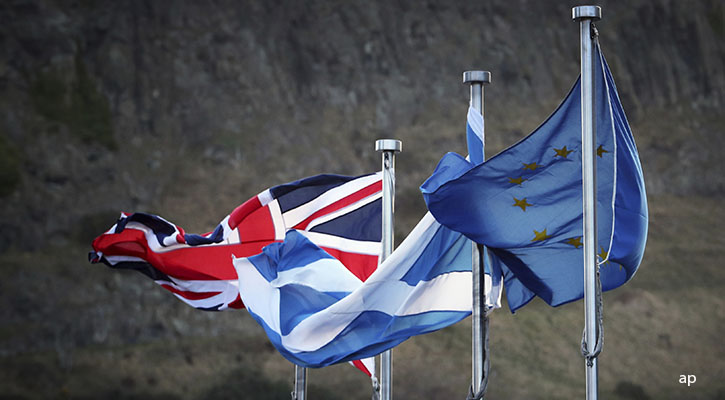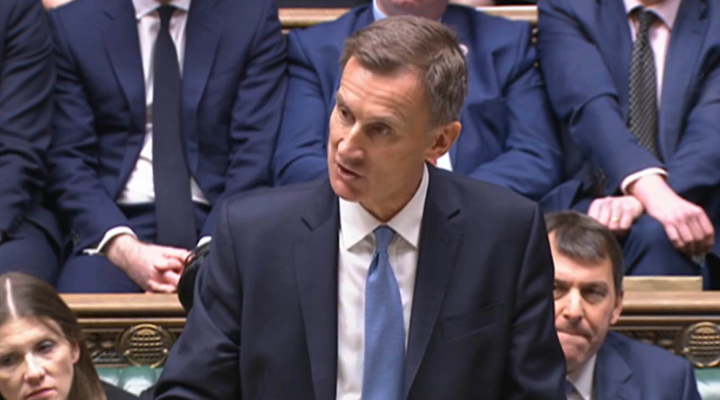
The pound rose on Wednesday morning after the UK Supreme Court rejected the Scottish government’s move to hold a referendum on independence without Westminster's consent.
Ruling Scottish National Party (SNP) wanted to hold a referendum in October 2023, bypassing Westminster, arguing that a vote would be "advisory" and have no legal impact on the union between England and Scotland.
But the Court ruled that the SNP is unable to press ahead on this issue without agreement between the two parliaments, one in Edinburgh, the other in London.
SNP leader and first minister Nicola Sturgeon said she was disappointed by the ruling but tweeted: "a law that doesn't allow Scotland to choose our own future without Westminster consent exposes as myth any notion of the UK as a voluntary partnership & makes case for Indy." She said she will press on with attempts to hold a second referendum.
The pound has been on an upward trajectory since the dark days of late September when it threatened to hit parity against the dollar. Since hitting $1.07, it’s rebounded to around $1.19, helped by a market-pleasing Autumn Statement last week – and a change of prime minister and chancellor. Still, this issue is likely to be a slow burner in the coming years.
A vote on independence was held first in 2014, asking the question "should Scotland be an independent country?". Some 55.3% voters voted against and 44.7% voted in favour. Since then the UK has faced Brexit, the pandemic and war in Ukraine.
Currently, voters are split down the middle on the issue, according to polls, with a slight leaning towards remaining in the Union, which dates back to 1707.
Richer, Happier
In a paper published in summer 2022, Sturgeon wrote: "for Scotland, the aspiration of a wealthier, fairer and more successful country will depend on democratic decisions made post-independence and the good stewardship of governments elected."
In it, she argued Scotland should compare itself to its European neighbours and would be financially better off and "happier" outside of the UK.
One of the key uncertainties, at least from an economic perspective, is what currency Scotland could use after independence. Sterling would continue as legal tender for a period, before the country moved to a Scottish pound. The arguments are summarised in this policy document but can be distilled as:
- Bank of England still involved in monetary policy in transition period;
- Creation of independent Scottish Central Bank with remit for financial stability...;
- …which would monitor conditions ahead of transition to the Scottish pound.
But if Scotland re-joined the European Union – one of the key issues for certain voters otherwise on the fence – that could obligate the country to join the single currency and adopt the euro at some point. Croatia, for example, is joining the Eurozone in 2023, ten years after the country joined the EU, following a referendum the year before.
Oil, Pensions and Funds
Another issue is oil and gas revenues from the North Sea, which are currently booming after Russia’s invasion of Ukraine.
In last month’s SNP conference, Sturgeon proposed a quasi-sovereign wealth fund on Norwegian lines, which would be set up within 10 years. The "Building a New Scotland" fund would raise £20 billion from a mixture of fossil fuel revenues and government borrowing.
From UK investors and savers' perspective, Scottish independence raises questions about pensions and funds. A number of asset managers are based in Scotland, while pension companies Scottish Widows and Standard Life – owned by Lloyds and Phoenix respectively – are headquartered in Edinburgh. The UK government still owns a 48% stake in NatWest, formerly Royal Bank of Scotland, after the bank was nationalised during the financial crisis.
"Following a vote for independence, Scotland would remain part of the UK while the terms of independence are negotiated," Holyrood said in October.
"During this period, arrangements would be put in place to enable financial services and products to operate in the same way following independence as they do now. This would maintain confidence and financial stability."







.jpg)



















